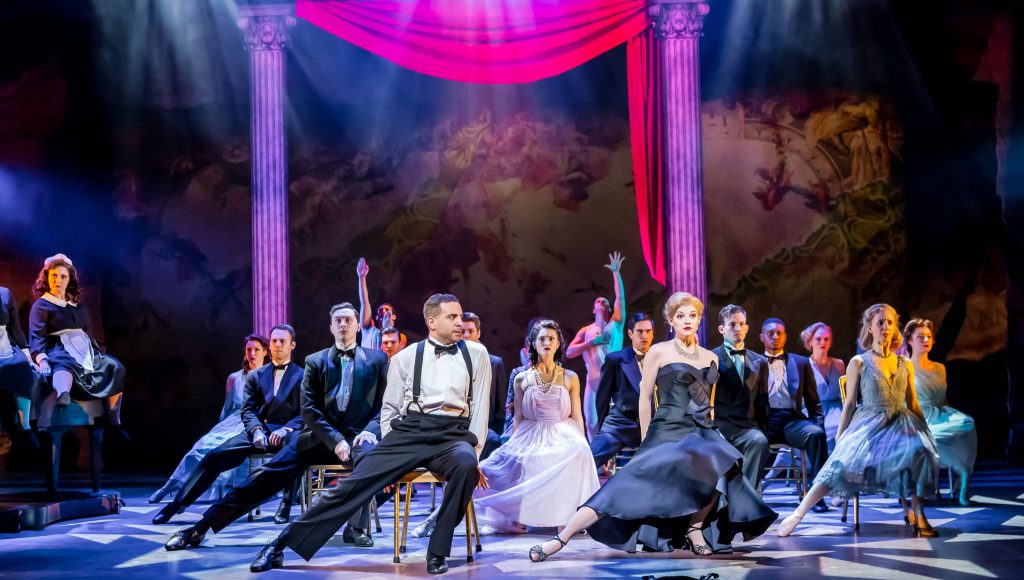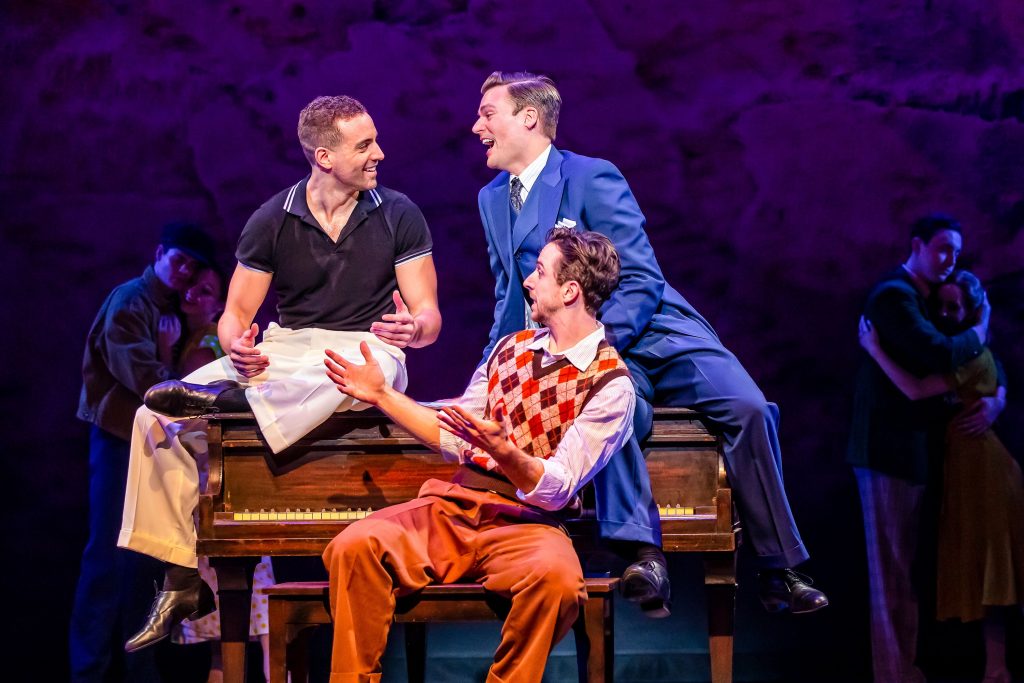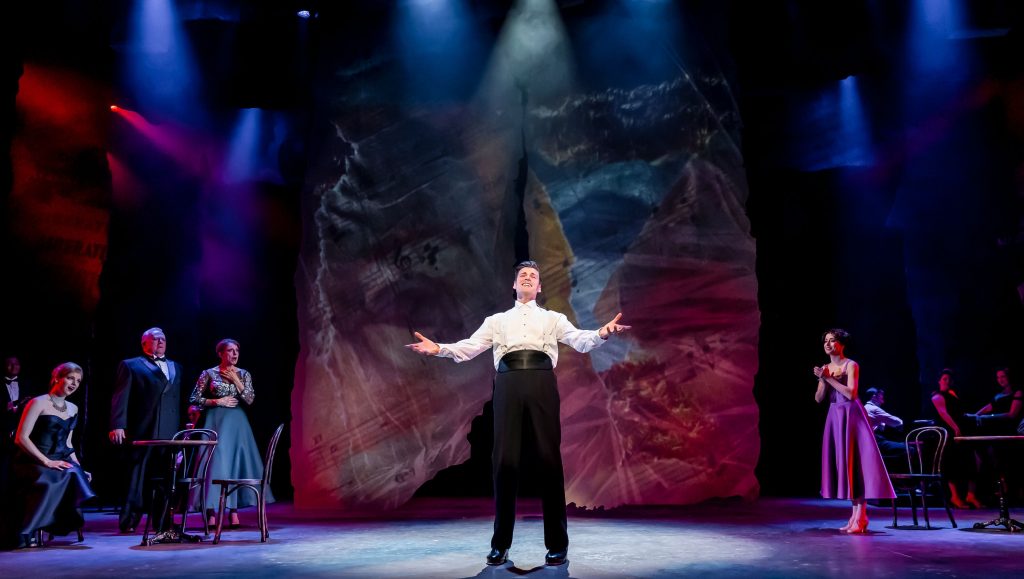
Culturally, the distance between 1951 and 2020 is vast. It’s the distance between a new born entering a world transformed from what it was nearly seventy years ago and her grandparents or great-grandparents who’ve watched a Cold War dissolve and the overwhelming digitization of the planet. A span of time that could easily induce nostalgia.
Keeping that tendency in check is just one of the things that makes Drury Lane’s current production of An American in Paris so gratifying and so surprising. Like a copy that keeps all the key elements of the original, the Drury Lane’s version of this richly pleasing classic has been contoured and shaped to make it better reflect the realities of post-war Europe and injects the story’s characters with greater complexity.

Neither of those things stop it from being a lovely production. If anything, in this staging, they help to more finely gild the lily. Opting for subtle elegance, Kevin Depinet’s set breathes with a baroque refinement that manages to be both polished and cultivated without being excessive. As the frame for a story about stumbling into love in a city defined by romance and haggard from war, the set quietly transforms throughout the performance to softly, and often beautifully, complement both the music and story’s contemporized progression.
Gershwin’s lush score, under Chris Sargent’s sure orchestral lead, may remain as resplendent as always; but the resilient people it wraps around display a little more of the grit and effort needed to fight yourself out of the residue of war and into a brighter future. Having lived through the sacrifices and losses that come with occupation, Lise’s (Leigh-Ann Esty) focus is on the responsibilities needed to survive. And, as a committed and talented artist, to follow her pointe shoe dreams. She has little time for the attentions of an American GI, no matter how persistent and self-effacingly ebullient he is.

A not so subtle emphasis on the arts is another of the surprises of this American in Paris. Like a discreet embellishment or a pleasing recurring sensation, it kept surfacing to highlight the importance of creative expression is to each of the main characters. It’s an essential part of all of them. Jerry Mulligan, the affable GI played so disarmingly by Josh Drake, is a gifted visual artist hoping to make his mark in Paris, the soul of western art. As does his pal, Adam (Skyler Adams) whose muse is music and whose output is prodigious and exceptional; especially when it’s fueled by an unrequited love for a woman two other men are vying to win. The third man out to conquer Lise’s heart poses the biggest challenge to the others. With money, name and position in his cupid’s arsenal, his edge seems insurmountable.
Taking the love story in three different directions opened the plot to tantalizing possibilities. If played for genuine dramatic intensity rather than clever plot expansion, it could be considered operatic because the conditions for tragedy are so fertile. Here the seriousness is handled with a deft lightness. Henri, with Will Skrip unforgettable in the role, torments himself hiding two things that make him who he is. He’s an artist too, and just as driven to see how high his talent can propel him as a singer. But, as the only heir of a fabric dynasty, his parents have a different destiny in their sights for him; causing him to hilariously chase his dreams in secret.

Henri’s much harder to read when it comes to his other secret. That’s partly because it’s so clear to everyone else. As Skrip embodies him under Lynne Kurdziel-Formato direction, you’re never sure whether Henri’s acknowledged or even recognized his sexual self. Or is he in some kind of unconscious denial? His feelings for Lise seem to possess all the right markers of love; absent the passion. A crippling omission. But Skrip fills the character with so much sincerity and so much humor that it’s impossible not to cheer for him. The same could just as easily be said of Skyler Adams.
These shifts of dramatic approach add a fresh vibrancy to the meaning behind many of the musical’s most treasured songs. I Got Rhythm and ‘S Wonderful in the first act keep their timeless brilliance but in the second act, Who Cares, But Not For Me and They Can’t Take That Away From Me make you listen to them with a new set of ears because the point of view of the characters have taken on a different cast. In 1951, some considered An American in Paris’s plot “slender”. Craig Lucas, in this effort, has given it satisfying sinew and muscle.

Erica Evans turn as Milo Davenport, a wealthy American patron of the arts who Henri’s chic mother (Caron Buinis) considers a mere “dilettante”, alternates between ruthless and vulnerable before settling into realistic in her chances of making Jerry fall in love with her. Given her character’s social standing and privilege, she also had the opportunity to wear some of Karl Green’s most sublimely elegant costumes.
Handling the play’s choreography as well its direction, Ms. Kurdziel-Formato took full advantage of a delightful cast and ensemble that could do any and everything enviably. Of the many winning dance numbers running through the show, and depending on who you’re talking to, Fidgety Feet still induces the biggest smiles.
An American in Paris
January 31 – March 29th, 2020
Drury Lane Theatre
100 Drury Lane
Oakbrook Terrace, IL 60181
630-530-0111